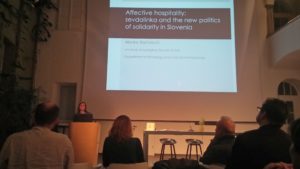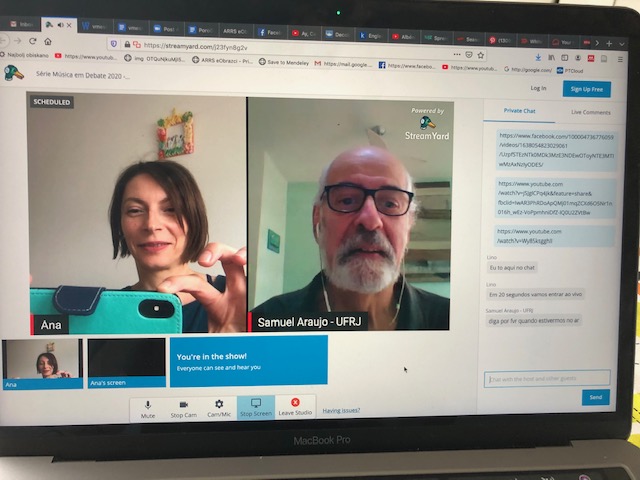The journal Narodna umjetnost has published an article by Mojca Kovačič entitled Creating Atmospheric Coherence through Commemorative Rituals, Singing Partisan Songs, and Rehearsed Affect (https://hrcak.srce.hr/267009). The article presents aspects of affective atmospheres in the context of commemorating the events of the Second World War in post-socialist Slovenia. Particular emphasis is placed on the role of partisan songs in establishing relations between the past and the present, discussed with specific reference to commemorative events and the experiences of singers in a rural choir. Individual narratives revealed the internal dynamics of each singer’s experience while singing partisan songs, as well as the role that collective memory, the past, history, politics, and personal narratives play in that experience. The singers’ experiences also provide the basis for questioning the concepts of coherence within the theory of affective atmospheres.
Martin Pogačar – A microphone in a chandelier: How a secret recording sparks mnemonic imagination and affect
Memory Studies published a paper »A microphone in a chandelier: How a secret recording sparks mnemonic imagination and affect« by Martin Pogačar. The article examines a recording of an old Slovenian choral song made in 1941 during the Fascist occupation. Pogačar analyses the recording as a temporal object that drives affective mnemohistories; modulates individual and collective experiences, expectations and interpretations; and induces mnemonic imagination. He furthermore discusses the song’s historical background, its technical history, and compares its affective force in live performances and in mediated experiences in YouTube. The investigation of the song as a temporal object that engenders variegated, multilayered engagements with the past contributes to the debates on the study of music and memory, and the history of media technologies in the context of post-socialist memory.
Radio Talk on the phenomenon of Bella Ciao
Listen to the radio talk about the iconic song Bella Ciao made by Ivan Bradin and Radio Rojc from Pula. About the genealogy of the song, its old and new lives and political potentiality talk: musicologist Nusa Hauser, researcher and musician Dario Marušić, ethnomusicologist Ana Hofman and the founder of band “KUD Idijoti” Sale Veruda.
American Musicological Society Annual Meeting, Virtual, 11–12 and 20–21 November 2022
Panel: Feeling Powerful – Sonics, Politics, and Affective Regimes
The physical aspects of music and sound, or “vibrational practice,” in Nina Sun Eidsheim’s terms (2015), rely on physical experience contextualized and eliciting an affective response. By revisiting definitions of “power” (Walser 1993), in which power comes from feelings of controlling sound, this panel suggests how shared physical experience may be differently felt and contextualized in the realms of affect theory (Hofman 2015, Massumi 2016) and sound studies (Cusick 2006, Daughtry 2015, Tausig 2019) with an emphasis on the transformational affective potential of sonic embodiment (Eidsheim 2015, Hofman 2020, Cox 2016).
Each case study investigates the varied ways in which the vibrational-acoustic qualities of voice create types of social engagement that exist on heightened emotive terrain. Across each case study, we link cultural responses to “affective regimes,” defined broadly as the often overlapping and sometimes contradictory logics of capital, technological development, urban space, and governance that inform the sounded dimensions of contemporary social life (Mankekar and Gupta 2016; Navaro 2019). Considering affective regimes as a means of analysis enables us to foreground “the corporeal body whose bodily processes are being reshaped by the logics of capital and technology, in short, not just the laboring body but the feeling body” (Mankekar and Gupta 2016, 38). Imagining a scaffold of affective regimes guided by spatial acoustic and embodied sonic practices, case studies in varied contexts – extremist politics in Metal music; affective curation in professional choral performance; and the use of found acoustics in chant-driven protest – show how sound can overwhelm, subvert, and channel power through controlling emotional guidelines and embodied experience. These papers suggest an expanded definition of “power” that affords new ways to theorize physical experience as connected to political kineticism via physicality and affective drive. Moreover, this scholarship explores the tenuous distinctions between beingpowerful and feeling powerful in consideration of the overlapping and sometimes contradictory logics of capital, technological development, urban space, and governance that inform the sounded dimensions of contemporary social life.
Participants:
Eugenia Siegel Conte, University of California, Santa Barbara
Max Z. Jack, Humboldt-Universität zu Berlin
Jillian Fischer, University of California, Santa Barbara
Discussant:
Ana Hofman, Research Centre of Slovenian Academy of Sciences and Arts
Society for Ethnomusicology, 66th Annual Meeting, Virtual, 28–31 October 2021
Panel Abstract: Complicating “Affective Labor” in Ethnomusicology
Ethnomusicologists, increasingly interested in both affects and forms of musical work, use the term “affective labor” to denote the feelingful dimension of what musicians produce, whether or not they’re paid. Work on “affective” or “immaterial” labor argues that the production of subjectivities, particularly through the consumption of cultural products like music, is key to neoliberal socio-economic organization, where wages are gained through affective performance. This panel offers a productive critique of “affective labor” and the concepts it rests upon. Specifically, in setting affective labor as a unique form of work, the term suggests a division between labor that involves thought and feeling, and labor that involves “only” bodies, reproducing problematic conceptions of culture as “immaterial.” Moreover, the term muddies the ability to discuss the relation between acts which produce feelings as part of social meaning, and those which (also) produce profit. Each of these papers addresses the relations between affect, labor, and wage. The first examines musical and personal narratives about Punjabi truck drivers’ work ethics and disaffection, which reveal how patterns of circulation of material goods determine patterns of affect; the second focuses on musical leisure as a conceptual framework that questions the affective labor paradigm in the post-socialist context; and the third examines Brazilian Spotify contractors whose ability to curate branded playlists arose from their long involvement in unpaid, yet densely affective music production. The total panel, including a discussant, offers what we hope is a critical extension of an exciting new arena of ethnomusicological research.
Participants:
Ana Hofman, Research Centre of Slovenian Academy of Sciences and ArtsBack to Leisure: Labour, Class and Everyday Singing in a Post-Socialist Town
Davindar Singh, Harvard University
The Drive to Work: Punjabi Truck Songs and the Ethics of “Dis-Affected” Labor
Garland, Shannon, University of California, Merced
The Work of Making Moods: The Concrete Labor of Spotify Curation
First online seminar: Musica em Debate
The online discussion was hosted by Samuel Araujo and several ethnomusicological organizations in Brazil (Ethnomusicology Laboratory and Musiculture Group – Tide, UFRJ, UFPA Ethnomusicology Laboratory composed of the Studies Group on Music in Pará, Research Group on Music and Identity in the Amazon, both from UFPA, and the Studies Group of Music in the Amazon, from UEPA).
SIEF Working Group BASE: Bodies, Affects, Senses and Emotions 3rd workshop in Ljubljana, Slovenia, 4 and 5 June 2020
The 3rd BASE workshop seeks to explore the work which is currently being done by working group members and other researchers whose work focuses on the body, affects, senses and emotions.
We invite 20-minute presentations from scholars across the arts & humanities concerned with the focus of the working group – bodies, affects, emotions, senses – but taking a variety of perspectives (historical, synchronic etc). We especially welcome presentations that focus on “collective becomings” – affective politics in the time of global uprisings.
Proposals of no more than 300 words, accompanied by a max 100-word biography, should be submitted to Ana Hofman ahofman@zrc-sazu.si and to basewg@siefhome.org by Monday, 3 February 2020.
Workshop Convenor: Dr. Ana Hofman, Institute of Culture and Memory Studies, Research Centre of Slovenian Academy of Sciences and Arts
Venue: Research Centre of the Slovenian Academy of Sciences and Arts
Local organising team: Dr. Ana Hofman, Dr. Martin Pogačar, Teja Komel Klepec (Institute of Culture and Memory Studies, Research Centre of Slovenian Academy of Sciences and Arts)
Ana Hofman – SINGing, SOCIALizing, SELForganizing: An insight into an engaged Viennese music collective
It is the evening of 11 December in Vienna’s 15th district, and I am sitting with Jana, Lejla, and Šarlot, eagerly awaiting the screening of a documentary about a unique community choir on the occasion of its fourth anniversary. We are in Brunnengasse, known as a migrant district of Vienna, at the AU Gallery, which is starting to crowd with men, women, and children of all ages and various ethnicities, all of them warmly greeting each other. In this setting, through the documentary and a public rehearsal that soon began, I became acquainted with a most interesting Viennese singing collective, the 29th of NovemberChoir. Vienna is a city known for its music, and one can expect many different musical networks, organizations, and professional bodies. And yet the choir members, many of whom I met at the documentary screening, do not perceive themselves as musicians at all. Rather, they claim radical amateurism, musical self-education, and self-organization. Why?
More information available here.
Alenka Bartulović, Affective hospitality: sevdalinka and the new politics of solidarity in Slovenia
In the framework of Erasmus+ teaching exchange, Assist. Prof. Alenka Bartulović gave four lectures at the University of Zadar at the end of October. She addressed the imagining of the future in post-war Sarajevo and especially the role of music in antinationalist activism. In her second lecture she focused on affectivity and politics of Bosnian music, particularly sevdalinka in Ljubljana in the 1990s.

14th International Society for Ethnology and Folklore (SIEF)
Ana Hofman and Mojca Kovačič presented the project at the 14th International Society for Ethnology and Folklore(SIEF) congress entitled: “Track Changes: Reflecting on a Transforming World.” They presented the paper “Affective politics in a time of political exhaustion: a sonic view” in the panel Affect and atmospheres in the ethnographic betweenorganized by the SIEF Working Group on Body, Affects, Senses, and Emotions (BASE), organized by Deborah Kapchan (New York University) and Birgit Abels (Georg August University Göttingen).
More about the panel: https://nomadit.co.uk/conference/sief2019/p/7120
The project team joined the SIEF Working Group on Body, Affects, Senses, and Emotions and participated at the group meeting.
Continue reading “14th International Society for Ethnology and Folklore (SIEF)”


